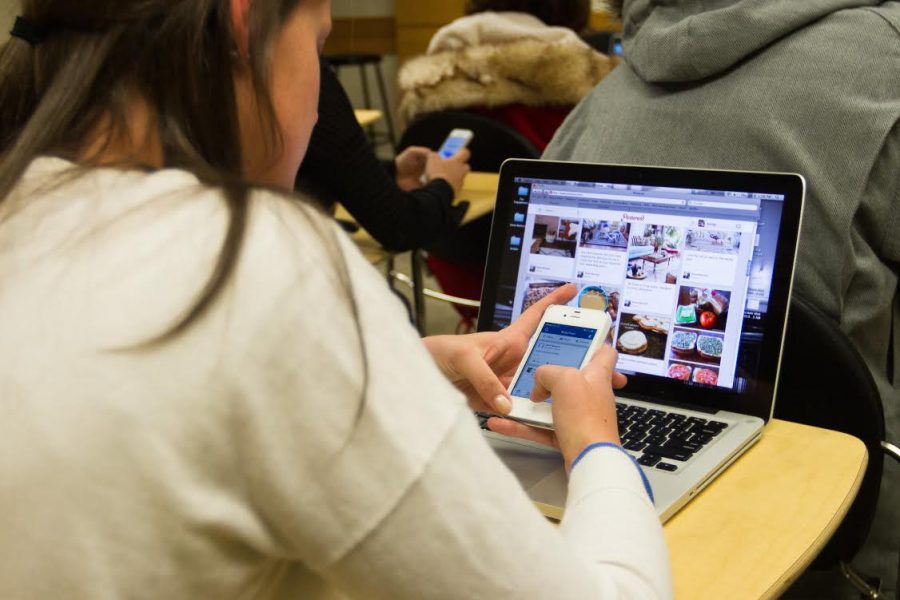Technology: Temptation or Teacher?
An analysis of technology’s benefits (or lack thereof) in the classroom
Sarah Hill / The Daily Universe
Students often use technology in class despite professor’s wishes.
Computer science expert Keith Beard has written in the book “Internet Addiction: A Handbook and Guide to Evaluation and Treatment,” that technology is not inherently distracting, but the way that teenagers use technology can cause major problems in school, home life and self-image. For example, a cell phone is essentially just a communication tool. It eases the burden of family-to-teen communication, which is why many parents buy them for their teens. However, when teens begin to use cell phones for other purposes — which they almost certainly will — the technology can prove distracting.
If you have been to an average American high school, you have probably noticed that many teenagers are glued to their phones, in the hallways or even in the classroom. The slow, distracted movements in the hallway add to the drab feel of highschool.
The use of phones in class really depends on what class it is. Rina Tu, a freshman says that her phone usage is based off of what class she is in. “Some teachers don’t allow phones in class, so I check my phone an average of 0.1 times in their class. Other teachers are more relaxed on their phone usage policies, so I usually check my phone about 3 times in those classes.”
Usually once or twice. I’m pretty skittish about the teacher taking my phone so I try to keep it to a minimum. If the class isn’t doing much, then I’m on it. — Maddy Holman
When someone is on their phone in class, they are missing out on learning the material being taught. When a test comes around, the student who didn’t get on their phone versus the student to was on their phone will most likely get a better grade. Andrew Yang, a sophomore, agrees with this correlation, and also its impact at home. He says that “the bigger impact would be at home because at home no one is there to keep you on task like a teacher would.”
Most teenagers, if not all, have access to a cell phone. Many people think that phones are one of the biggest distractors at NA, but after interviewing many students, the blame for distraction is actually the laptops!
I usually am not tempted to play games on my computer, but oftentimes I read newspaper articles or messages on Google Hangouts. On the flip side, I find it much easier to focus on activities online rather than worksheets. — Ainsley Ferron
Each and every high school student at North Allegheny has a school-issued laptop. About 80% of school work is on the laptops. These devices give us the opportunity to collaborate with peers for projects, take and receive notes, and work on our school work virtually anywhere.
Teachers full well understand that every moment can be monopolized by one class, and we need breaks too. They often assign homework or even classwork to work on at home to alleviate stress. Some take advantage of this and use their devices for things not pertaining to school during classes and at home, and become addicted to them.
While there are many benefits to having laptops, they often provide a gateway to procrastination. Procrastination does differ for everyone, but technology lets us slip into the trap even faster. Varsha Kaveti says that she often works on homework, and spends time on the internet. “I can watch Glee videos and study for math at the same time.”
Some people believe that procrastination is purely a choice, not a habit. Andrew Baierl says that “Kids that get distracted on laptops will find a way to get distracted. The kids who actually try do get a lot done.”
While sitting in class, I personally have noticed that many other students play games, read online articles, and do pretty much anything that isn’t related to their classwork. If we didn’t have the laptops, would our school be better off?
Ainsley Ferron says, “No. While I think technology does make it more likely that people will get distracted, it also allows people to play to their strengths to personalize an environment that best accommodates how they learn.”
Another aspect of the laptops are the restrictions. The school has set up certain filters and restrictions to the sites we visit, and programs to download. While most students do understand why they are there, they often find them annoying and do not allow them to complete some work. Andrew Yang believes that, “The restrictions on laptops induce kids to break the rules. If the school would loosen up the restrictions, it would allow us to use and learn more about technology. It’s a reverse psychology thing.”
At North Allegheny, one of the main sites we use in the classroom is Blackboard. Recently, the co-founder and CEO of this company stepped down. Our world is at a risk of depending on technology so much, and then failing when it fails.
The school would still be able to operate without Blackboard, but it would not be able to operate at its max potential. Blackboard provides an “one-stop shop” for all of a student’s assignments and class plans. — Rina Tu
Would our school be able to operate without Blackboard? To this question, Isabel Garcia, a freshman, says “Absolutely! Old school is still an option, paper and pencil.” Taylor Cooke, a sophomore, enjoys using Blackboard. She said, “I like how easily accessible it is. And how you can directly see the calendar with all of the homework and tests in one schedule.”
Blackboard can be counter-reactive though. When the wifi goes down at school, which it often does, Blackboard is unavailable for use. In addition to this, some teachers have issues with Blackboard, and some don’t use it at all. Andrew Baierl says, “Last year, my teachers didn’t use anything, but this year all of my teachers use Google Drive. I don’t mind it (Blackboard), but a majority of my teacher’s don’t use it.”
Rina Tu makes a strong point about having technology in the classroom: “I believe that the personal devices really allow students quick access to unlimited resources that can greatly benefit their learning experience. Students no longer have to spend unnecessary time on basic menial tasks that can instead be completed online. This leaves more time for students to further engage themselves in providing an in-depth learning experience, the key to a successful education.”
Overall, there are many views on the topic of technology. It can lead to more learning and productivity, and it can lead to mind-numbing and procrastination. Either on our own, or in the classroom, we DO have control of the technology. It’s just up to whether we control it, or let it control us.

Grade: 10
Years on Staff: 1
Role: Staff Writer
Life Soundtracks: What a Wonderful World~ Louis Armstrong, I Want You Back~ Jackson 5, Brighter Than...







